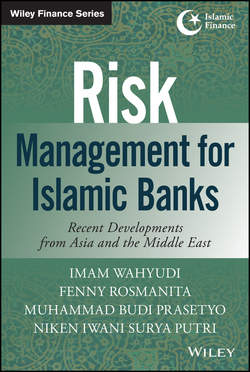Читать книгу Risk Management for Islamic Banks - Imam Wahyudi - Страница 10
На сайте Литреса книга снята с продажи.
Part One
Introduction
Chapter 1
Principles of the Islamic Financial System
Islamic Financial Contracts: The li-tabarru' Contract versus li-tijari Contract
ОглавлениеBased on the purpose or reason of a contract's formation between two people or more, financial contracts can be divided into three. First is the contract for the purpose of generating profit, called li-tijari. Every party in the contract is aware that they or their cosigners enter into the contract for the purpose of acquiring personal gain for themselves through the contract. Usually there is a bargaining and negotiating process, either bilaterally or multilaterally, on the specifications of the contract, such as the terms for price, quality, and quantity of the object; the ratio; the timeframe of settlement; the time of delivery; the time of payment; and the like. With this awareness, all sides have willingly accepted the risk inherent in the contract and have no regrets if the realization of the contract is different from their expectation. In mu'amalah, there are many examples of this sort of contract, like sale (bay'), rent or lease (ijarah), partnering in business (syirkah), the cultivation of agriculture (musaqat), and so forth. Islam allows anyone to enter a transaction with the intention of gaining profit as in the various contracts mentioned, as long as the contracts are made properly and are also executed properly. The profits gained from these contracts are incomes that are lawful and good, for they are gained by the efforts of one's own hand.
Second is the contract that is made with the purpose of giving reward, aid, or assistance to other people; this is called the li-tabarru' contract. This type of contract is usually entered by those who are in need, have lived through a catastrophe, or are under problems that cause them to need the assistance of others. In this contract, negotiation or bargaining is rarely found except in payment terms and due date, where both are related to the ease preferred by the party in need. Because of this, Islam loathes anyone who exploits the opportunities that arise from other people's needs for personal gain or profit, material or immaterial, through any assistance rendered. Among the examples are loan or debt (qardh), entrustment (wadhiah), representation (wakalah), borrowing or lending (dayn), transfer of debts between debtors (hawalah), etc. In qaidah fiqhiyah, it is said, “every loan receivable that generates benefit/gain, then it is usury” (Asy-Syairazi, Al-Muhadzdzab: 1/304). Included in this group of contracts is a contract of guarantee over debts or loans, like third-party guarantees (kafalah) and asset-backed guarantees (rahn).
It is hoped that by knowing the division of financial contracts and by executing them consistently, one can avoid various forms of usurious transaction. For example, when one is interested in helping others who need capital for business, but is still at the same time interested in turning a profit, then the li-tijari contract can be used, like murabahah or ijarah. In both of these contracts, the capital owner can receive profit in the form of sales margin or rental fee, and the entrepreneur receive working capital in the form of fixed assets without having to expend money at the beginning. Other than that, by understanding the purpose for financial contracts, the parties involved can realize their position within the contract and their rights and responsibilities.
